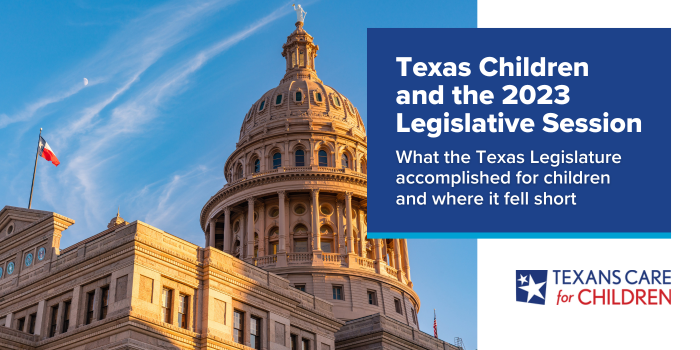We want each and every child to grow up in a thriving family and healthy community. State leaders had an opportunity to focus the 2023 legislative session and the state’s $33 billion budget surplus on moving Texas closer to achieving that vision.
Unfortunately, in many ways, the Legislature fell short. Lawmakers did not address the scale of the child care crisis facing our state. Although Texas has the nation’s worst uninsured rates for kids and adults, with high rates among Texans of all backgrounds, lawmakers did not pass Medicaid expansion or legislation aimed at improving health coverage for kids. As schools face acute shortages of teachers and other resource challenges, state leaders failed to provide the education funding needed to cover inflation and enrollment growth. Legislators also missed the opportunity to provide much-needed direct funding to school districts to support student mental health. Texans calling on the Legislature to reduce gun violence after the Uvalde school massacre were sorely disappointed by the lack of results this session, too.
While these and other disappointments are a big part of the story from this session, they are far from the whole story.
This session, we also saw legislators, advocates, and other Texans come together, roll up their sleeves, and pass proposals that will profoundly improve the lives of children throughout the state. We are overjoyed that after three legislative sessions, and after countless Texans pitched in, the Legislature voted overwhelmingly to allow moms to keep using their Medicaid health insurance for a full 12 months after their pregnancy. The new policy will support healthy moms and babies, reduce maternal mortality, and address health disparities. Although it wasn’t in the headlines, the Legislature also took positive steps forward to support kids in foster care and to strengthen services aimed at keeping kids safely with their families and out of foster care. For example, SB 1930 will ensure that youth in foster care spend more time in loving homes with caring families instead of impersonal facilities with a high risk of abuse. Lawmakers also answered the call to provide a meaningful increase in Early Childhood Intervention (ECI) funding so infants and toddlers with disabilities can learn to walk, communicate with their families, or reach other milestones.
Even where the Legislature fell short, momentum created this session will help spur more victories for kids down the road. The House passed an exciting new proposal to help connect uninsured but eligible kids to health coverage, although it did not pass the Senate. A $2.3 billion child care funding proposal did not pass, but it was part of an unprecedented legislative discussion about the role the state could play in supporting high-quality child care. The proposed Student Mental Health Allotment helped focus attention on the need for direct funding to schools for mental health strategies, even though it did not pass.
The following report describes these and other accomplishments, disappointments, critical next steps, and the fate of over 100 key bills in the four issues at the heart of our policy work: children’s mental health, maternal and child health, early learning, and child protection.
I’m so proud of everything accomplished this session by our team, partner organizations, supporters, concerned Texans who raised their voices, and the legislators and staffers who made kids a priority.
This work is hard. It takes time and focus. But I am optimistic about what we can do together for Texas kids and families as we confront the challenges and opportunities ahead.
- Stephanie Rubin
CEO
You can also skip to individual sections of the report:



